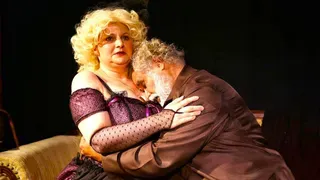December 15, 2013
The Merry Wives Of Windsor
Beth Dugan READ TIME: 3 MIN.
William Shakespeare's "The Merry Wives of Windsor" is one of his more popular comedies and shares many elements with "A Midsummer Night's Dream," "The Taming of the Shrew" and "Much Ado About Nothing." The Chicago Shakespeare Theater's production was a delightfully fun holiday-themed comedy. With live dogs on stage!
This play is considered one of the first, if not the first situation comedy, and stars Sir John Falstaff, the notorious womanizing, hard living, perpetually broke, good-natured companion to Henry IV. Falstaff is corpulent, lazy and considers himself quite the ladies man whose charms cannot be resisted. He is currently lacking in funds and tries a complicated scheme of wooing the two wives of the richest men in Windsor to earn some money.
The women easily see through his ham-handed plan and dupe him several times. One of the wives, Mistress Page, is trying to marry off her daughter to an eligible French veterinarian, while her husband has his eye on another man whose proclivities seem to lie elsewhere. Their daughter has her own ideas, of course, and is interested in a young, handsome American soldier.
This version is set during the late 1940s with a soundtrack and costumes that are of the same time. There are several enjoyable interludes of the jitterbug and other dancing and singing. The costumes are beautiful and pay homage to that period of time in England, when they were climbing out of the deprivation of the war, but not yet back to their former glory.
There are also three canine actors on-stage who delight the audience every time they appear; an imposing Great Dane, an elderly but spritely Beagle, and lovely blonde Bouvier or maybe a Labradoodle. They, along with the copious amounts of snow that fell on-stage, elicited oohs and aahs from the audience.
Falstaff, one of the most mischievous and darkly affable characters Shakespeare wrote, appears in his second play. He is played by Scott Jaeck who fills him with charm, energy and a wonderfully physical presence. Jaeck, a veteran of Chicago theater, wears thickening layers and full beard as Falstaff, and still manages to imbue his character with subtle comedy and a certain dignity that it would be easy to lose. Falstaff is a clown, but as the axiom goes, he is the hero of his story, and he takes himself seriously, even if no one around him does. Falstaff believes in Falstaff and Jaeck's Falstaff is a comedian's dream.
The titular wives, played by Heidi Kettering as Mistress Ford and Kelli Fox as Mistress Page, light up the stage as they plot to both humiliate Falstaff and scheme against their husbands for their own amusement. Kettering gives such a warm and funny performance, acting as the foil to Falstaff's fool -- she is a joy to watch.
Fox, likewise, moves with such confidence as Page that she transports the audience right into the middle of her plotting. Master Page, played by Kevin Gudahl, and Master Ford, played by Ross Lehman, manage to be part of the plot without looking completely foolish, which is something Shakespeare did not always allow of his tricked husbands. Gudahl, in particular, gives a hilarious dual performance as Master Page and his counterpart (a character he takes on to further the deception of Falstaff).
When I read "The Merry Wives of Windsor" in college, I remember a lot more overt misogyny, which was lacking from this staging. Similar to the "Taming of the Shrew," this play had some gender roles and stereotypes that are disturbing to a modern sensibility. The Chicago Shakespeare Theater has done a superb job of smudging the rough edge of gender politics away and making a sweet, funny story about the differences between wives and husbands, young and old, without making anyone a fool or a caricature.
All the supporting performances are energetic and nuanced as well. "The Merry Wives of Windsor" is a wonderful play with a subtle but energizing holiday theme. It would be a treat to view this season.
Beth is a freelance writer living and working in Chicago. Her work has appeared in Salon.com, TimeOut Chicago, Chicago Collection Magazine, Ducts.org, and many other places. She fears the suburbs and mayonnaise. You can read more about her work at http://www.bethdugan.com/







